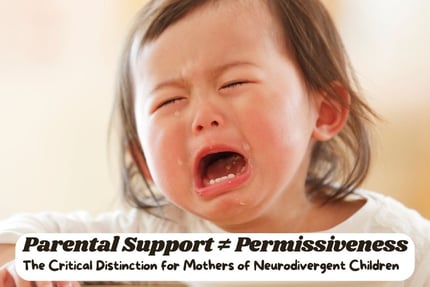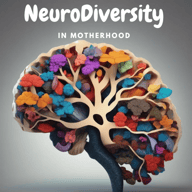Parental Support ≠ Permissiveness: The Critical Distinction for Mothers of Neurodivergent Children
As a mental health practitioner specialising in emotional well-being and the mother of a 2E twice-exceptional child, I understand that being supportive and not being permissive is difficult in our daily life raising our neurodiverse child, but it is essential. Mistaking support for permissiveness can undermine your child's development, impair emotional regulation, and hinder long-term success. This distinction is supported by extensive research in neurodevelopment, psychology, and educational strategies, which emphasise that strategic support, rather than permissiveness, is crucial during every developmental stage.


Support involves providing a safe environment where boundaries, structure, and guidance are balanced with emotional validation. It is about understanding your child's unique wiring and responding with empathy and consistency. Support is rooted in the concept of responsive caregiving, which is linked to secure attachment, emotional resilience, and healthier neurodevelopment outcomes (Ainsworth et al., 1978). Support helps children learn self-regulation, executive functioning, and social skills, particularly during sensitive periods of neuroplasticity in early childhood (Shonkoff & Phillips, 2000).
Permissiveness, however, entails a passive or lenient parenting style where boundaries are unclear or frequently ignored. This approach may temporarily reduce conflicts but tends to encourage maladaptive behaviours, poor impulse control, and difficulty developing autonomous emotional regulation (Baumrind, 1966). Research indicates that permissiveness is associated with increased behavioural issues and emotional dysregulation in neurodiverse children (McLachlan et al., 2020).
The Evidence Base: Early Intervention and Structured Support
Early intervention is crucial for children with neurodivergent. The Head Start Program Evaluation (U.S. Department of Health and Human Services, 2010) demonstrates that support strategies, such as visual supports, consistent routines, and social skills training, maximize neuroplasticity and promote adaptive development. These strategies hinge on active parental involvement, emphasizing that support means guiding and scaffolding, not allowing the child to be unregulated or disrespect boundaries.
Furthermore, the Neurodiversity Paradigm emphasizes the acceptance of neurodivergent traits while simultaneously supporting skill development. This approach is associated with better emotional well-being, social functioning, and adaptive behaviours (Armstrong, 2010).
Why the Distinction Matters in Practice
Nodes of high leverage, such as consistency, emotional validation, and teaching self-regulation, are central to effective parenting. An authoritarian or permissive approach diminishes these, increasing the risk of behavioural problems and emotional distress, especially in adolescence when social relationships become complex (Ginsburg et al., 2009). Conversely, supportive practices such as setting boundaries, maintaining predictable routines, and providing emotional coaching help children develop resilience, independence, and social competence (Landry et al., 2006).
Practical Implications for Mothers
Support is responsive, consistent, and rooted in understanding. It involves setting clear boundaries, providing encouragement, and acknowledging your child's feelings. Permissiveness often manifests as inconsistent discipline, overindulgence, or the avoidance of necessary boundaries, which can hinder progress and social integration.
Research suggests that parents who adopt a supportive, structured parenting style, such as authoritative parenting, see improvements in their children's behaviour and emotional regulation (Baumrind, 1991). This approach promotes secure attachment and fosters self-regulation, emotional stability, and social competence.
Conclusion
Mothers of neurodivergent children must be able to differentiate very well between support and permissiveness. Support, grounded in evidence-based practices, enhances emotional health, promotes resilience, and respects your child's unique brain connections. Permissiveness, however, undermines these key developmental processes. By providing consistent boundaries, emotional validation, and supportive guidance, you empower your child to thrive both today and in the future.
Referências:
Ainsworth, M. D. S., Blehar, M. C., Waters, E., & Wall, S. (1978). Patterns of attachment: A psychological study of the strange situation. Hillsdale: Lawrence Erlbaum.
Armstrong, T. (2010). The power of neurodiversity: Why inclusion increases innovation. Devoré.
Baumrind, D. (1966). Effects of Authoritative Parental Control on Child Behaviour Child Development, 37(4), 887–906.
Baumrind, D. (1991). The influence of parenting style on adolescent competence and substance use. The Journal of Early Adolescence, 11(1), 56–95.
Ginsburg, G. S., et al. (2009). Parenting and child mental health: An integrative review. Journal of Pediatric Psychology, 34(4), 362–376.
Landry, S. H., Smith, K. E., & Swank, P.
